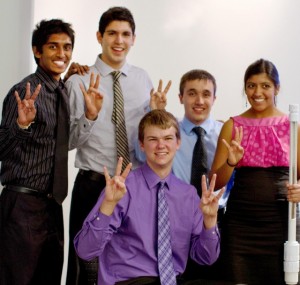
Engineering students in final round of international innovation competition

33 Buckets team members – giving the ASU Sun Devil “pitchfork” hand sign – are (left to right) Varendra Silva, Mark Huerta, Connor Wiegand, Paul Strong and Pankti Shah. The ASU engineering students are competing in the finals of the international Dell Social Innovation Challenge. Photo by: Jessica Slater/ASU.
Posted: June 1, 2012
Team 33 Buckets is comprised of mechanical engineering senior Paul Strong and four biomedical engineering students – team leader and senior Pankti Shah, senior Varendra Silva, senior Mark Huerta and junior Connor Wiegand. They will vie for the prizes of $50,000, $20,000 and $10,000, to be awarded to the first-, second- and third-place winners, respectively, at the Dell Challenge finals.
The team was formed through the Engineering Projects in Community Service (EPICS) program in ASU’s Ira A. Fulton Schools of Engineering. It was one of eight EPICS teams that were among the 200 teams chosen in the spring as Dell Challenge semifinalists.
System removes arsenic
33 Buckets derives its name from the atomic number of arsenic and the use of buckets in a particular filtration system. Its project is development of a low-cost, efficient and easily maintained filtration system that will remove bacteria and debris – most importantly arsenic – from tainted water wells in Bangladesh, where a quarter of the population is exposed to harmful amounts of arsenic, making it a leading cause of death in the country.
The team’s efforts are focusing first on the Rahima Hoque Girl’s School in the impoverished rural village near Dhaka in Bangladesh. The young students face health risks as the price of their education due to high arsenic concentration in the local water supply.
The filtration system is designed to produce 4,000 gallons of clean drinking water each day, which would leave the school an additional 2,000 gallons to sell to the village to raise funds for improving the school and for replacing the filter components as needed.
The idea for the project came from Enamul Hoque, a native of Bangladesh who earned a master’s degree in civil and environmental engineering from ASU in 1985 and now owns the Hoque & Associates engineering firm in Phoenix. The E.M. Hoque Geotechnical Laboratory at ASU is named for him.
Hoque established and maintains the Rahima Hoque Girl’s School in rural Bangladesh.
Field research in Bangladesh
Hoque accompanied the 33 Buckets team to Bangladesh for eight days in May to do field research for building a prototype of the filtration system and to establish a relationship with the school and the local community.
“I had never been to a Third World country before, so it was a lot to take in,” says team member Huerta. The team was greeted with warm hospitality and genuine gratitude by the villagers, he says.
The trip included visiting the University of Dhaka to make contacts with students and faculty members who live and work near the area where the team’s project will be implemented. One professor agreed to work with the team to test water samples periodically to ensure the quality and productivity of the filter.
“We were trying to find out if the people were willing to purchase the water, maintain the filter and accept the filter as a solution,” Silva says. They found the school’s students and the villagers are willing to maintain the filtration system, and to sell the extra filtered water at an affordable price for others in the community.
Based on their experience in Bangladesh, the team is making alterations to their project plans in preparation for the Dell Challenge finals competition.
EPICS successes
The director of ASU’s EPICS program has already been recognized by the Dell Challenge organization. Richard Filley recently won an honorable mention in the international 2012 Dell Social Innovation Education Awards.
He is one of only three honorable mention winners – in addition to an overall award winner – selected from among about 100 people who were nominated. The award recognizes dedication to supporting and mentoring students involved in developing innovative solutions to social problems, fostering creativity in classroom teaching methods and dedication to building institutional support for social innovation education.
Under Filley’s direction more 20 students teams working through EPICS have won awards and start-up funding for their entrepreneurial and public service endeavors.
Two other EPICS teams received $1,000 for People’s Choice Awards in the Dell Challenge semifinal round: Project TOTO and FlashFood.
Project TOTO is designing structurally sound tornado shelters out of steel shipping containers. FlashFood is using a mobile-phone application to connect restaurants, catering services and banquet halls that have excess or leftover food with volunteers who will transport it for distribution to people in need.
Engineering social progress
The Social Innovation Challenge was established in 2007 by the RGK Center for Philanthropy and Community Service in the LBJ School of Public Affairs at The University of Texas at Austin. In 2008, the Dell computer technology corporation joined the program as the title sponsor.
Its mission is to support promising young entrepreneurs who are working to help solve the world’s most challenging social problems.
Over those years, more than 15,000 students from 90 countries have teamed up to enter more than 3,000 projects in the annual competition.
This year 33 Buckets will compete against:
• Team Nanoly – students from Stanford, Duke, the University of California, Berkeley, and the Massachusetts Institute of Technology
• Team Essmart Global – students from the University of Cambridge (England), Tufts University, the Massachusetts Institute of Technology and Harvard
• Team e-Education in 5 Continents – students from the National University of Rwanda, the University of Dhaka (Bangladesh), the University of Jordan and Waseda University (Japan)
• Team Humanure Power Project – students from Tulane University in Louisiana
Written by Natalie Pierce and Joe Kullman



































